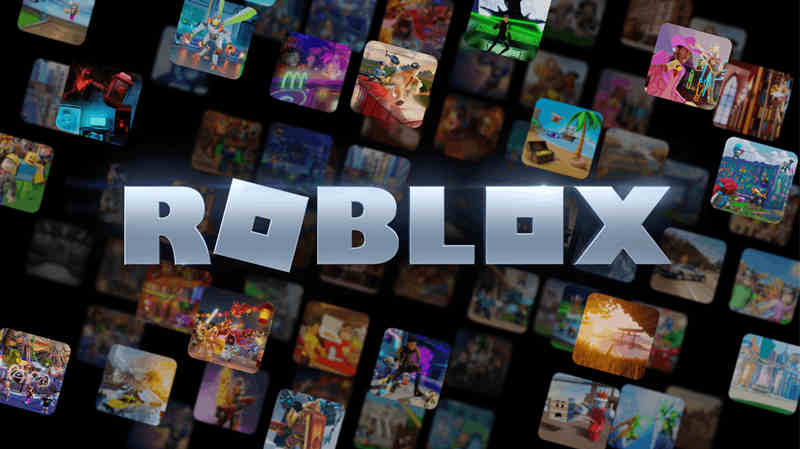When is it Safe for a Baby to Go In a Chlorinated Pool?
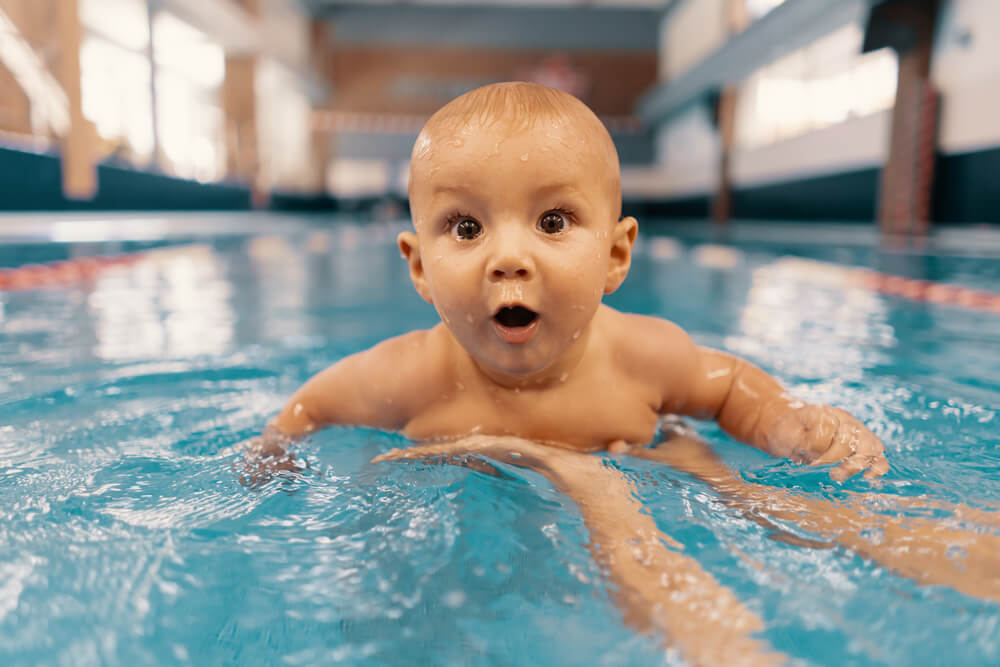
Babies tend to enjoy being in the water and, for parents, there is something really special about taking their little one to the pool for the first time. However, many moms and dads wonder when can a baby go in a chlorine pool, concerned about the possible effect of the strong chlorine, especially for newborns and very young children.
If you’d like to take your baby to the pool, but are keen to find out about the risks first, we’ve got all the information you need below. Let’s dive in—pun fully intended!
Contents:
- What are the Benefits of Taking a Baby Swimming?
- When Can a Baby Go in a Pool?
- Concerns and Questions About a Baby’s First Visit to the Pool
- Water Safety Tips for Taking Baby in the Pool
- FAQs
What are the Benefits of Taking a Baby Swimming?
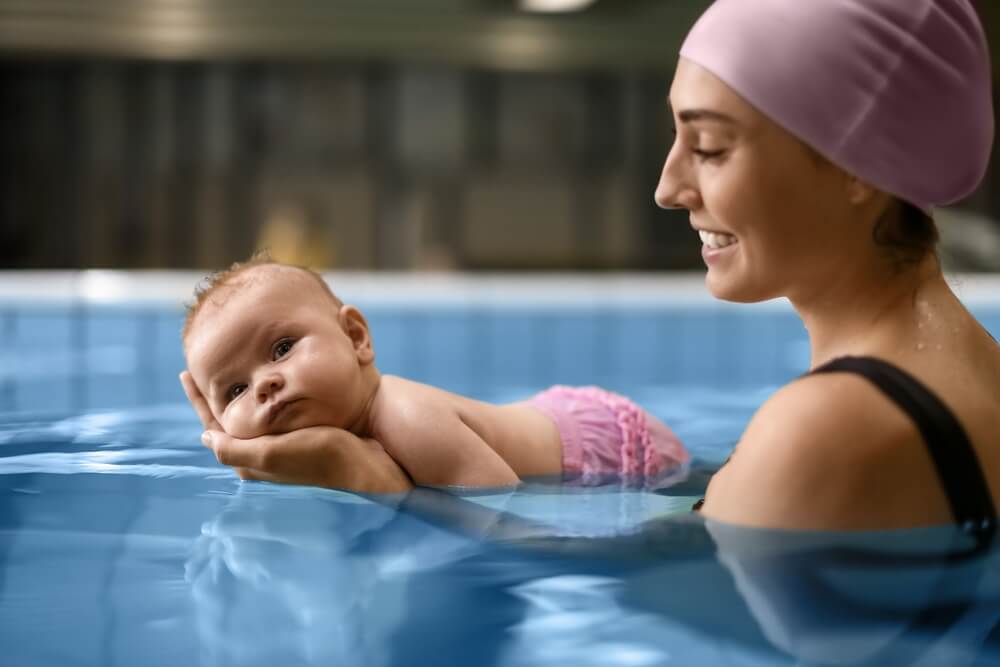
Pixel-Shot/Shutterstock.com
There are lots of reasons to take a baby swimming. It can be a great way to promote coordination, and balance and build muscle and strength—even on the inside, as swimming can help develop the strength of the heart and lungs. As your baby interacts with the water, they’ll be fascinated with the new ways it allows them to move their bodies.
On top of this, swimming has been linked to helping babies develop good sleeping patterns and a healthy appetite and is a wonderful bonding activity. Plus, introducing young kids to the pool early can help build water confidence and create a lifetime love of swimming.
When Can a Baby Go in a Pool?
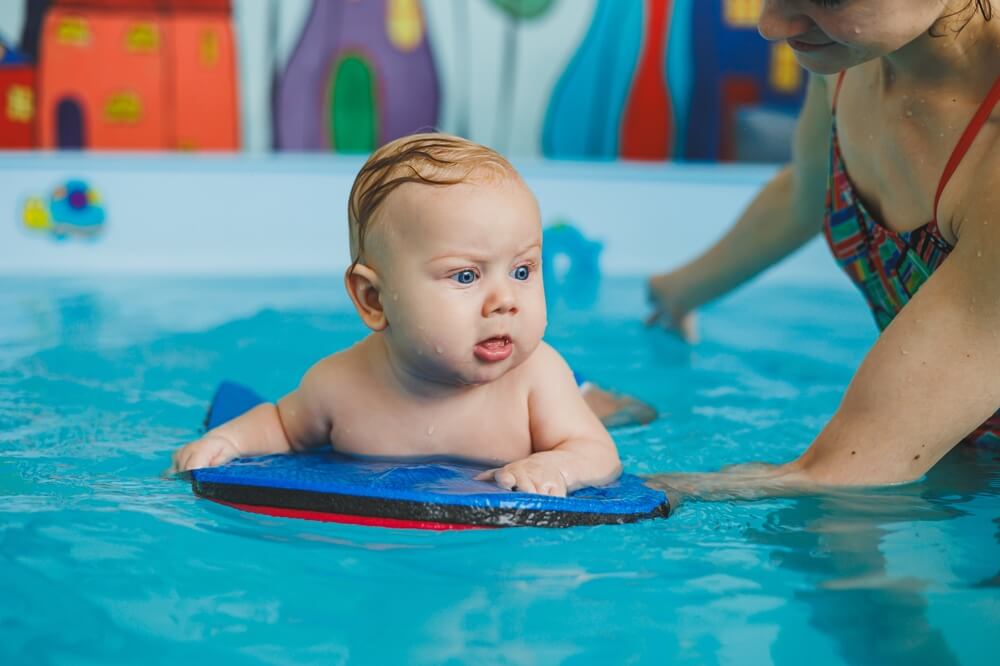
DS Tkachuk/Shutterstock.com
So, now we’ve talked about why swimming is such a beneficial activity, let’s turn to the question of when can babies go in the pool. In general, physicians recommend waiting until your baby is at least six months old before taking them into a chlorinated pool. If the levels of chlorine in a pool are too low, your child could be at risk of coming into contact with bacteria and disease-causing viruses and infections. However, if the chlorine levels are too high, this could irritate a very young child’s sensitive skin.
Why Wait Until Your Baby is 6 Months Old?
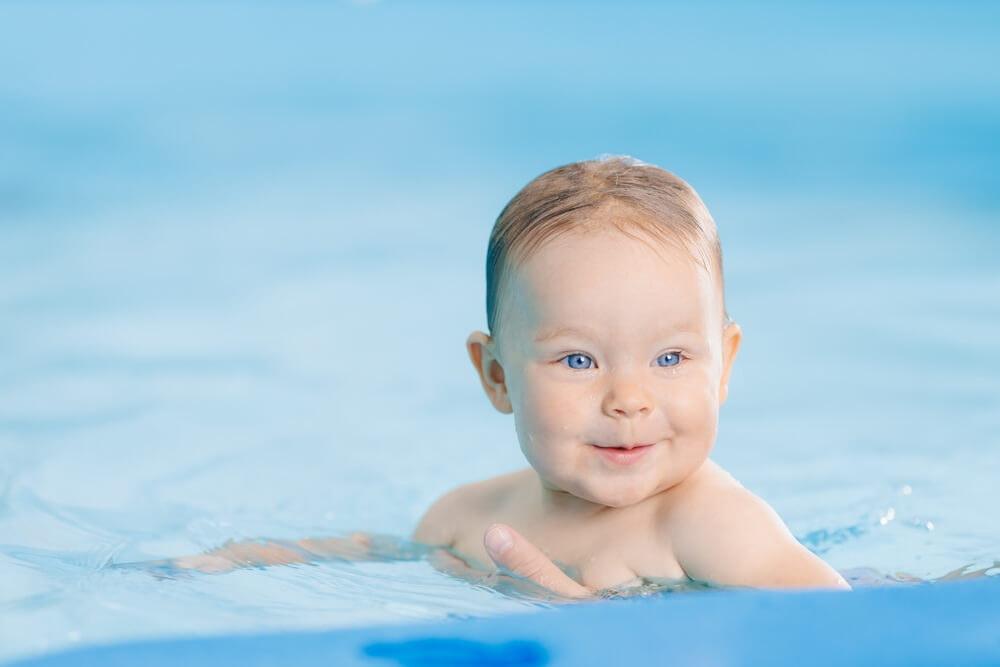
Parilov/Shutterstock.com
Here’s why six months is the suggested age:
- Temperature Regulation: Babies under six months have difficulty maintaining their body temperature. Being in a pool, even if it’s heated, can cause them to become cold quickly, leading to hypothermia.
- Immature Immune System: A newborn’s immune system is still developing, and public pools can carry germs that might be harmful. Waiting until six months allows their immune defenses to mature, lowering the risk of infections.
- Chlorine Sensitivity: The chemicals in pools, such as chlorine, can cause skin irritation or exacerbate conditions like eczema in young babies. Studies have shown that early, frequent exposure to chlorinated pools may increase the risk of asthma or bronchitis.
- Developmental Readiness: By six months, most babies are starting to hold their heads up and have better muscle control. This makes it safer for them to be in the water, as they can support themselves a bit more effectively.
Introducing your baby to the pool at the right time can be a fun and safe experience as long as you take proper precautions to ensure their health and comfort.
Concerns and Questions About a Baby’s First Visit to the Pool
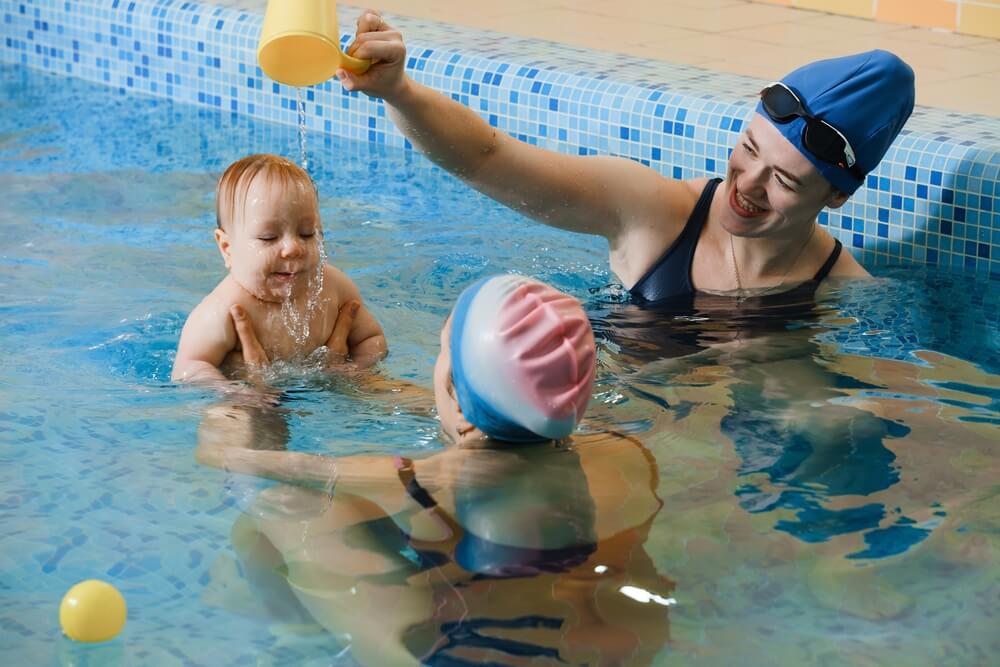
Nina Lishchuk/Shutterstock.com
Parents typically have several concerns and questions about their baby’s first visit to the pool, ranging from the best age to take their little one to the pool for the first time, to ensuring the baby stays safe in the water, and helping make sure the experience is a positive one—for everyone!
Keep reading to find out what you need to know.
Preparing for the First Visit to the Pool
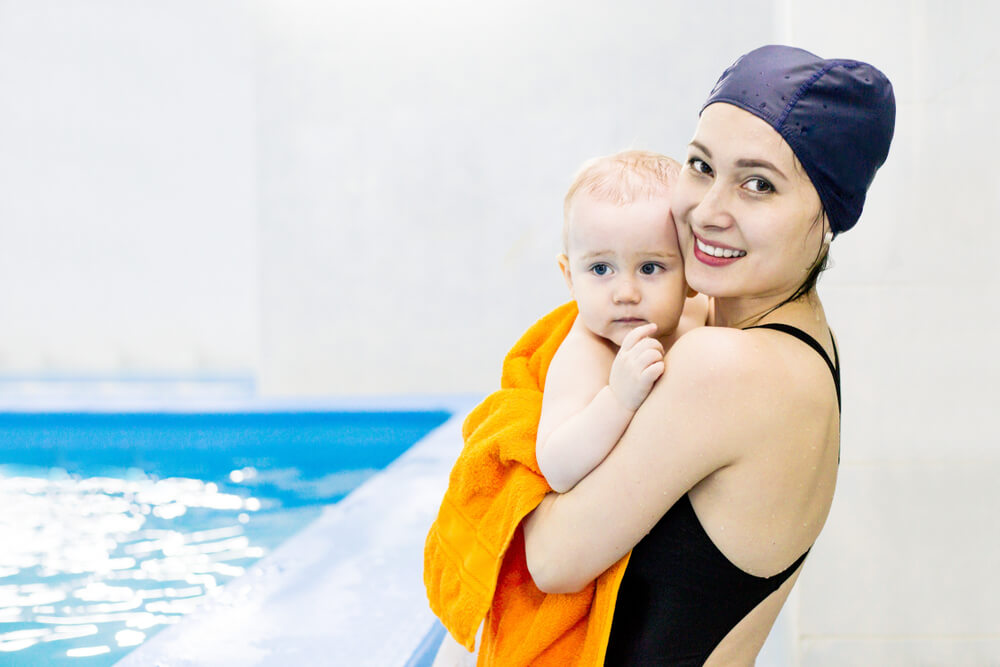
Yulai Studio/Shutterstock.com
So, the big day has arrived, and you’re getting ready to take your baby to the pool for the first time—how exciting! Below are some preparation tips to help ensure everything goes swimmingly:
- Consider booking baby swimming lessons, especially if you’re feeling a little nervous—many public pools offer these types of classes. They’re designed to gently introduce both you and your baby to water in a safe and controlled environment.
- Think about timing: avoid taking your little one for a swim when they’re tired or hungry. It’s best to schedule the pool visit for a time when your baby is well-rested and content.
- Pack essentials: take both regular diapers and swim diapers along with you, as well as extra clothing, towels, and a cozy dressing gown or poncho to wrap around yourself and your baby when you get out of the water. Don’t forget sunscreen if you’re heading to an outdoor pool!
- Bring a snack: Your baby might be hungry after their exciting visit to the pool, so it’s a good idea to take along a snack afterward. Breastfeeding or bottle-feeding can be a comforting option right after swimming too.
- Top tip: take along your baby’s favorite bath toy—a familiar, much-loved item from home can be reassuring when you hit the pool with your little one for the first time. It can also help them associate water with fun and safety.
When Сan a Baby Go in a Chlorine Pool?

DS Tkachuk/Shutterstock.com
For a newborn or very young baby, chlorine pools can mean increased exposure to risks, whether due to chlorine levels being too low or too high. Chlorine, while necessary to keep pool water safe from harmful bacteria, can irritate sensitive skin and affect the respiratory system. Given this, it’s best to wait until your baby is six months old before taking them to a chlorinated pool for the first time.
Further, most pediatricians recommend that a baby should be able to hold up his head well before going swimming, which usually happens at around four to five months of age.
It’s important to consider chlorine levels:
- Low chlorine levels: Can increase the risk of infections due to insufficient disinfection.
- High chlorine levels: Might irritate a baby’s eyes, skin, and lungs. Excessive exposure can even lead to more severe issues, like exacerbating asthma or allergies in predisposed children.
- Normal chlorine levels: The recommended free chlorine level for children should range from 1.0 to 3.0 ppm (parts per million), which is safe and effective for disinfection.
Are Saltwater Pools Safe for Babies?
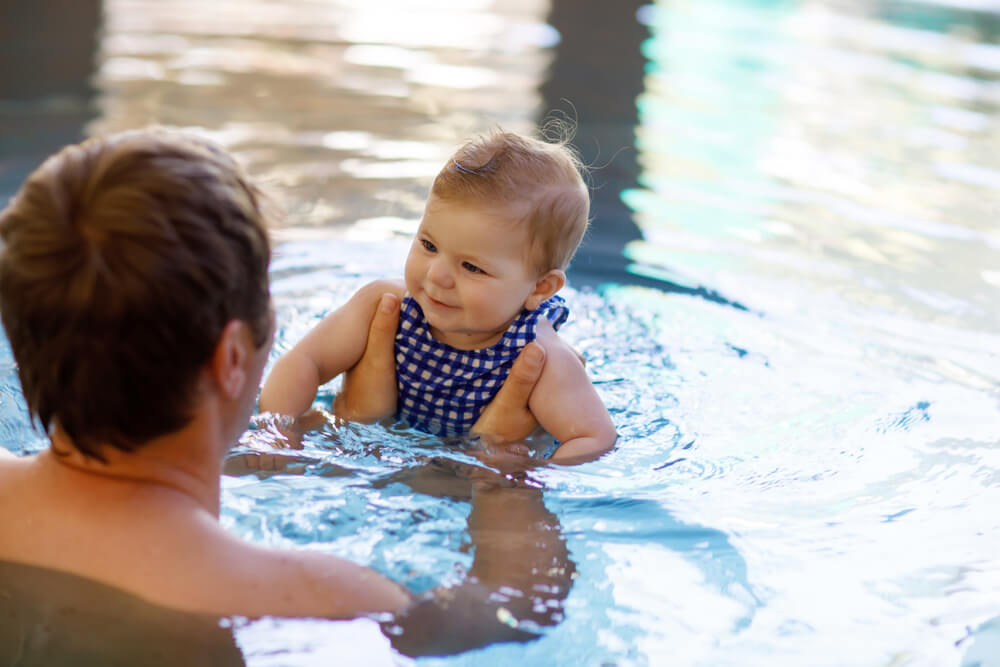
Irina Wilhauk/Shutterstock.com
But what about saltwater pools? Again, waiting until your baby is six months old—or even later than this—tends to be best. While the salt in the water isn’t inherently “bad” for babies, there are other risks associated with swimming in the ocean—it’s vital that kids are always closely supervised, and kept in the shallows.
Little ones’ heads should be kept above water to ensure they don’t swallow too much water, and their temperature carefully monitored; babies aren’t able to regulate their own temperature.
How Do I Protect My Baby From Chlorine in a Pool?
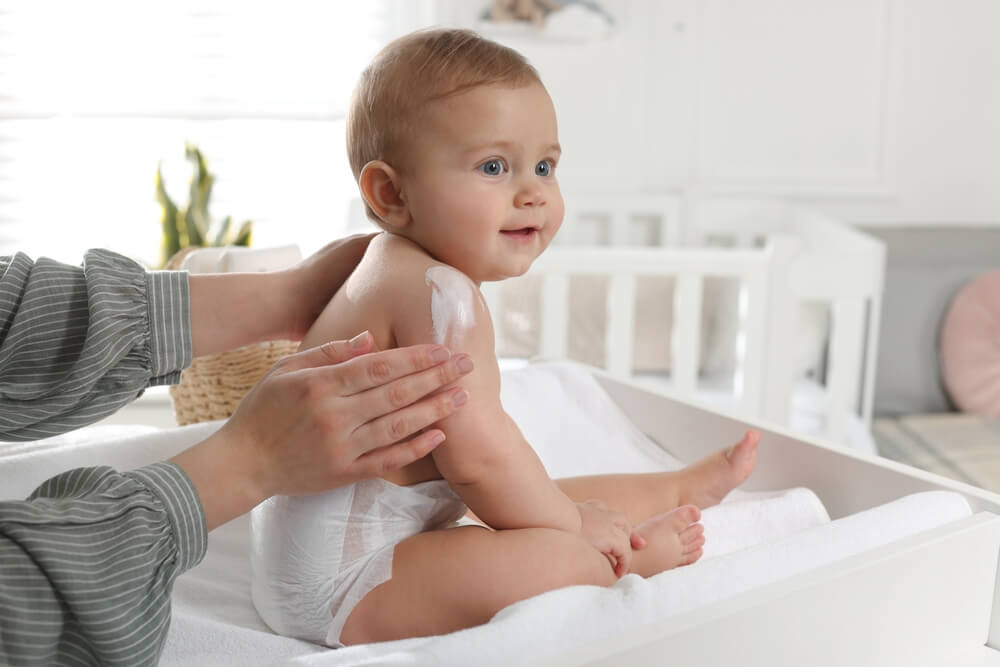
New Africa/Shutterstock.com
While there may be a link between early exposure to chlorine pools and an increase in the risk of developing asthma and bronchitis, it’s important to balance this against the fact that one of the leading causes of death in infancy is drowning. The main way to protect your little one from chlorine in pools is to start visiting the pool when it’s safe to do so, which is around six months of age.
Tips for reducing chlorine exposure:
- Limit the amount of time spent in the pool.
- Rinse your baby immediately after swimming.
- Apply a moisturizing lotion after the bath to keep your baby’s skin hydrated.
- Consider choosing pools with low chlorine levels or using pools treated with gentler alternatives, such as ozone or UV filtration systems.
It’s also important to consult with your pediatrician before taking your baby to the pool if they suffer from a respiratory condition or allergies.
Do Babies Need a Bath After Being in a Chlorine Pool?
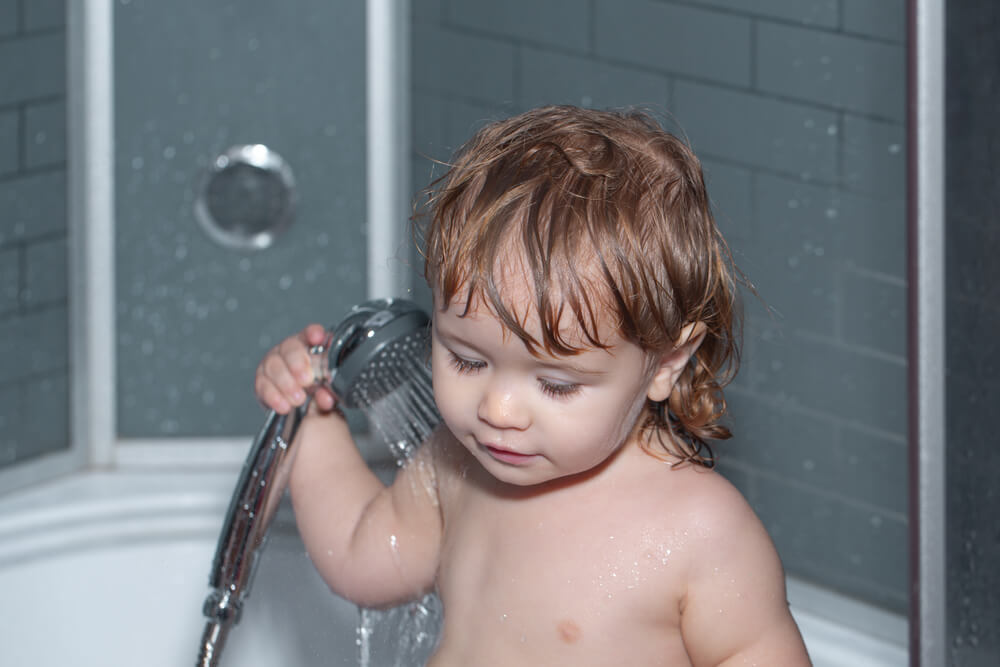
Volodymyr TVERDOKHLIB/Shutterstock.com
Giving your baby a bath after they’ve enjoyed some time in a chlorine pool is highly recommended, and can help avoid dry or irritated patches appearing on their delicate skin. Once you’ve gotten out of the pool it’s a good idea to give your baby a rinse in freshwater, followed by a “proper” bath once you get home.
Water Safety Tips for Taking Baby in the Pool
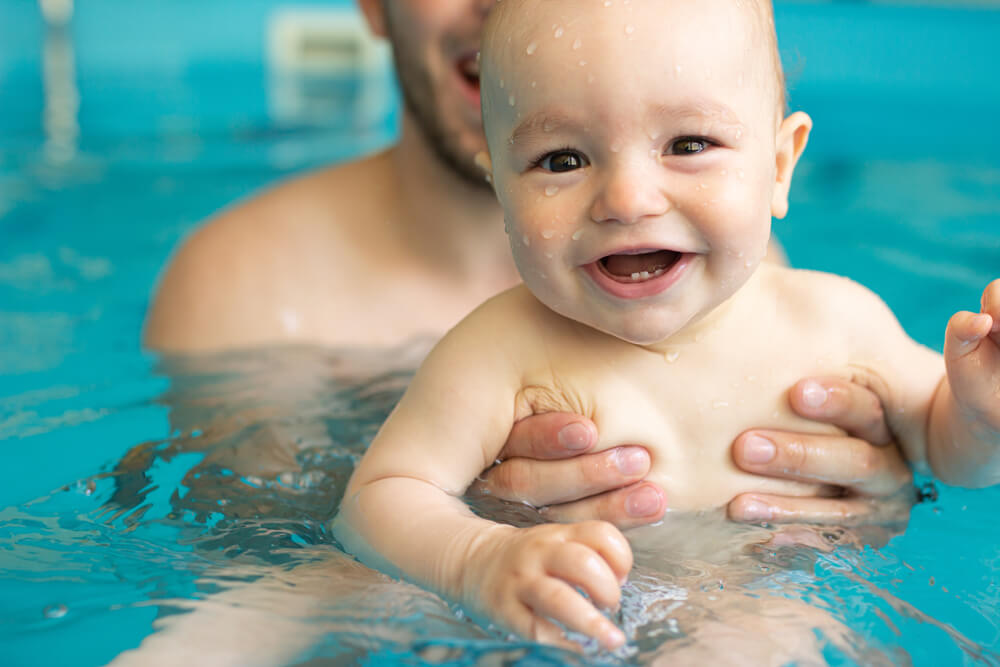
Ptashkimenko/Shutterstock.com
Safety is crucial when it comes to taking your baby to the pool. Here are the ways to help ensure your baby enjoys a safe and enjoyable experience:
- Never leave a baby alone and unsupervised in the pool, even for a moment, and even if they’re using a flotation device.
- Ensure the pool is the right temperature for your baby: remember that young babies can’t regulate their body temperature. The optimal pool temperature for babies is typically around 32–34°C (89.6–93.2°F) for those under six months and 30°C (86°F) for older babies. Colder temperatures can cause hypothermia, while water that is too warm may cause overheating.
- Consider taking a baby emergency first aid course. As well as giving you peace of mind, this could make a crucial difference in the unlikely event that an emergency occurs.
- Keep kids out of the pool if they’re ill: they should be symptom-free for at least 48 hours before going in the water. For certain types of diarrheal illness, children should be kept away from the pool for two weeks: your pediatrician can give you more advice on this.
Getting Set for a Lifetime of Swimming Enjoyment
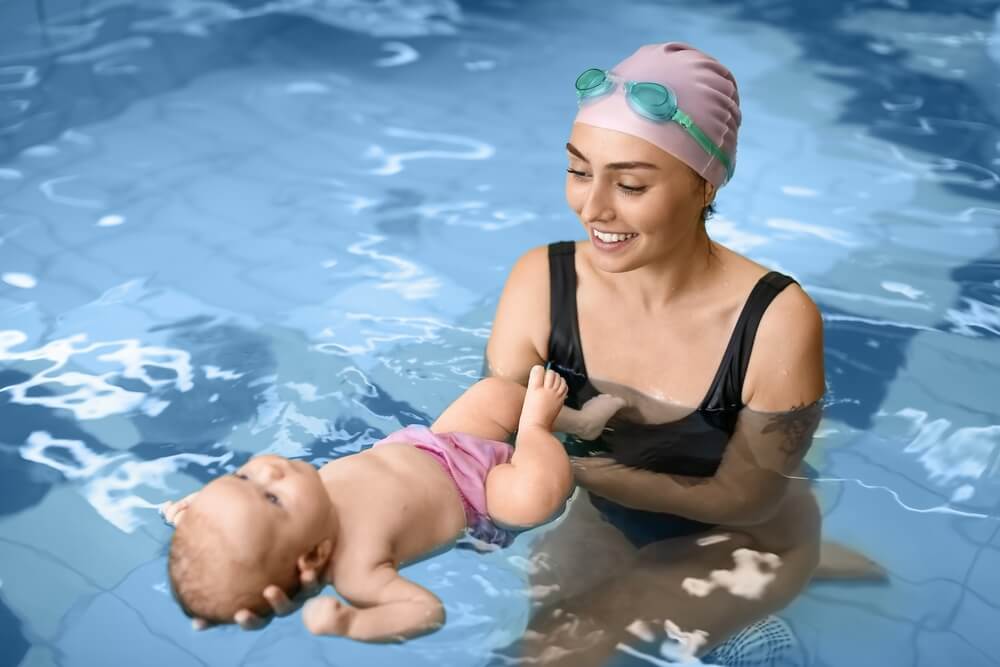
Pixel-Shot/Shutterstock.com
Taking your baby to the pool (once it’s safe to do so) can be an incredibly rewarding experience for both you and your baby. As well as being great for their development and wellbeing, promoting early water confidence can lead to building strong swimming skills later, and start your little one on the road to a lifetime of swimming enjoyment.
When did you take your child to the pool for the first time? We’d love it if you shared your tips for making this milestone visit as successful as possible—drop us a line in the comments box below!
FAQs
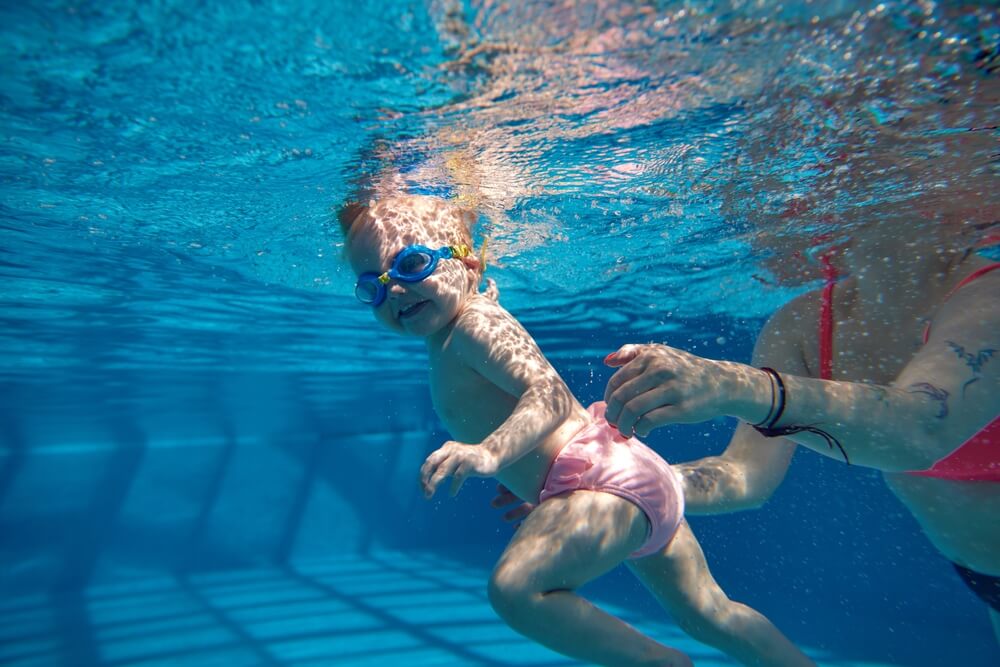
Master1305/Shutterstock.com
Can babies go underwater?
While babies can go underwater, it’s important to be aware of the risks, and they should only be “dunked” or allowed to go underwater if they’re comfortable doing so.
Is a chlorine pool safe for babies?
In general, pediatricians recommend waiting until a baby is six months old before taking them to a chlorine pool. This avoids exposing babies to the risks of either under or over-chlorinated pools.
Can I put a three-month-old in the pool?
While it’s possible to take a three-month-old to the pool, it’s important to be aware that if the chlorine levels of the pool are too low, this could put our baby at risk of infections and exposure to bacteria-causing disease. On the other hand, an overly chlorinated pool may irritate a young baby’s delicate skin.
How old can a baby go in a swimming pool?
It’s recommended that a baby is at least six months old before going to a swimming pool. They should also be able to hold their head up well, which usually happens at around the four to five-month mark.
When can a baby go in a chlorine pool in the NHS?
According to the NHS, you can take your baby swimming at any age, although it’s really important to ensure the water temperature is correct, as young babies aren’t able to regulate their temperatures, meaning they can get cold very quickly.
Can a three-month-old go in the ocean?
It’s generally recommended that babies should be at least six months old before taking them into the ocean. As well as being unable to regulate their body temperatures, very young babies may be at risk of exposure to bacteria, or of swallowing an excess of seawater.
The picture on the front page: diignat/Shutterstock.com
Проверьте электронный ящик















